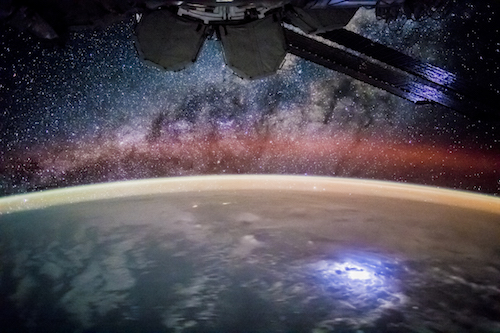 Evolution
Evolution
 Faith & Science
Faith & Science
 Intelligent Design
Intelligent Design
 Physics, Earth & Space
Physics, Earth & Space
Past Alien Civilizations Thesis Takes Another Blow

Writing at Forbes, astrophysicist Ethan Siegel delivers another hammer blow to Adam Frank’s past alien civilizations thesis (“Humanity May Be Alone In The Universe“). Interestingly he does so on identical grounds to those cited by Ross Anderson at The Atlantic (noted here yesterday). The New York Times also comes in for implied criticism for pursuing this particular angle — that the universe has hosted intelligent ETs, so we’re nothing special — in the larger campaign against human exceptionalism.
Says Dr. Siegel, the likelihood of all the conditions needed for the emergence of intelligent life on Earth or anywhere is simply unknown:
What [Frank] fails to account for, however, is the magnitude of the unknowns that abiogenesis, evolution, long-term habitability and other factors bring into the equation. Although it’s true that there are an astronomical number of possibilities for intelligent, technologically advanced lifeforms, the huge uncertainties make it a very real possibility that humans are the only spacefaring aliens our Universe has ever known.
Setting aside the rather large enigma of life from nonlife, what happens after life sparks itself into existence?
[E]ven if life does occur, how fortunate do you need to be to have it survive and thrive for billions of years? Would a catastrophic warming scenario, like Venus, be the norm? Or a catastrophic freezing scenario, like on Mars? Or would life wind up poisoning itself out of existence most of the time, as it almost did on Earth two billion years ago? And even if you had life make it for billions of years, how often would you get something like the Cambrian explosion, where huge, multicellular, macroscopic plants, animals and fungi came to dominate a planet? It could be relatively common, where maybe 10% of attempts make it, or it could be rare, where 1-in-a-million or even 1-in-a-billion are closer to the realistic odds.
Note the reference to the Cambrian explosion. He enters into Michael Denton territory (see Fire-Maker: How Humans Were Designed to Harness Fire and Transform Our Planet):
[H]ow rare is a tool-using, technology-developing, rocket ship-launching species like a human? Complex reptiles, birds and mammals that could be considered intelligent by many metrics have been around for tens to hundreds of millions of years, but modern humans came about less than one million years ago, and we only became what we’d consider “technologically advanced” in the last century or two. Is there a 10% chance that if you make it through the previous step, you get to a spacefaring civilization? Or is that more like one-in-a-thousand, one-in-a-million, one-in-a-trillion or even worse?
In conclusion:
The truth of the matter is this: we don’t know…. And no amount of speculation or pronouncements will substitute for that information; we’ve got to find it to know. Anything else, despite what the New York Times claims, is nothing more than guesswork.
It’s a strong article. Read it.
I find this interesting. Evolutionists are at pains to convince us that all the steps needed to produce Homo sapiens or something like us from scratch on a lifeless planet are basically a snap, given the vast stretches of time that we know are available. Doubters are dismissed as creationists. But Ross Anderson is no “creationist,” nor is Ethan Siegel.
Our colleague Dr. Denton has catalogued all the fantastically refined chemical, physiological, planetary, and other fine-tuning needed to permit life capable of employing fire, with all that, in turn, makes possible by way of building a civilization. See, too, his book Nature’s Destiny: How the Laws of Biology Reveal Purpose in the Universe. The universe, he shows, is pre-adapted for us. The cosmos saw us coming.
Dogmatic materialists are in denial about all that. More objective observers like Anderson and Siegel concede that the dogmatism, the certitude is a bluff: “The truth of the matter is this: we don’t know.” Actually, we know far more than they seem to realize — that is the gist of Denton’s work. But admitting what you don’t know is welcome progress.
Photo credit: Stargazing From the International Space Station, via NASA.
